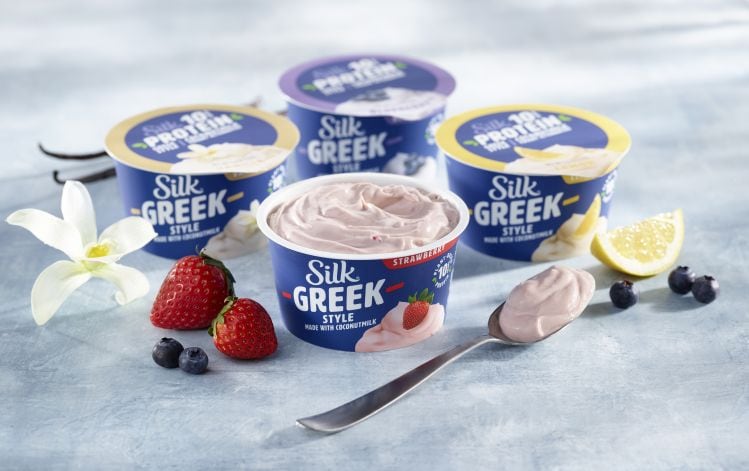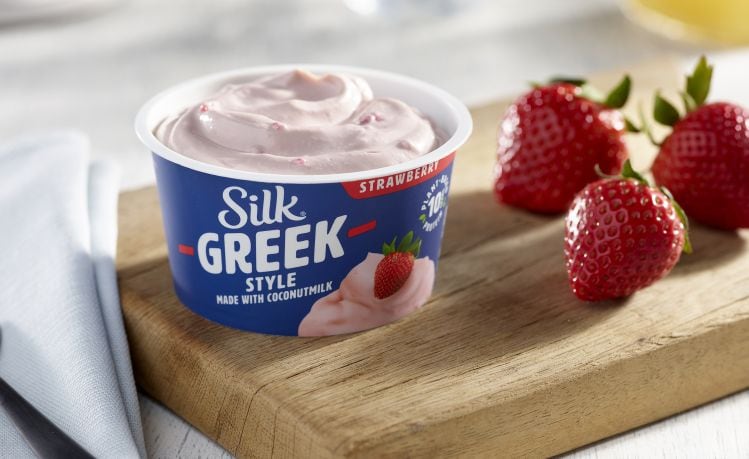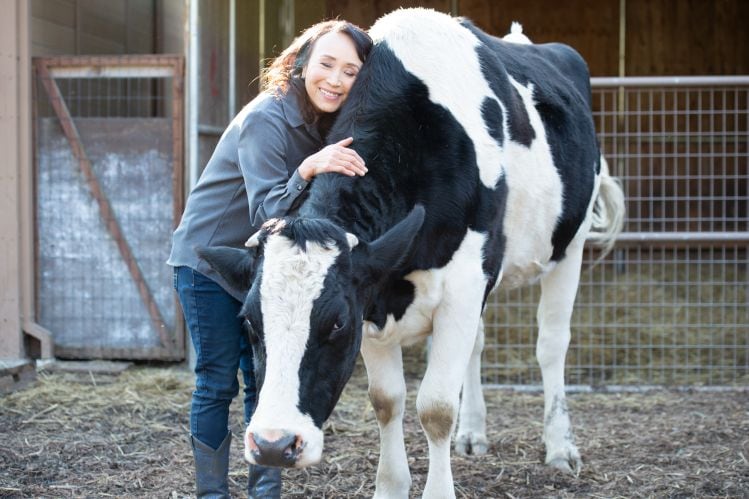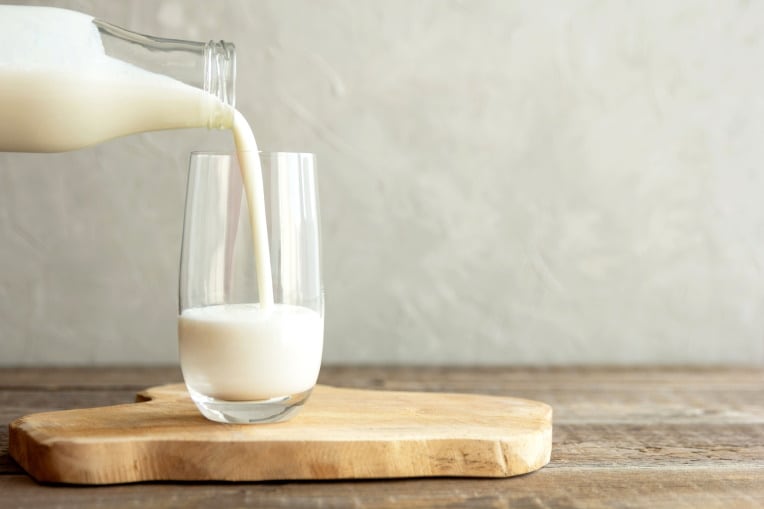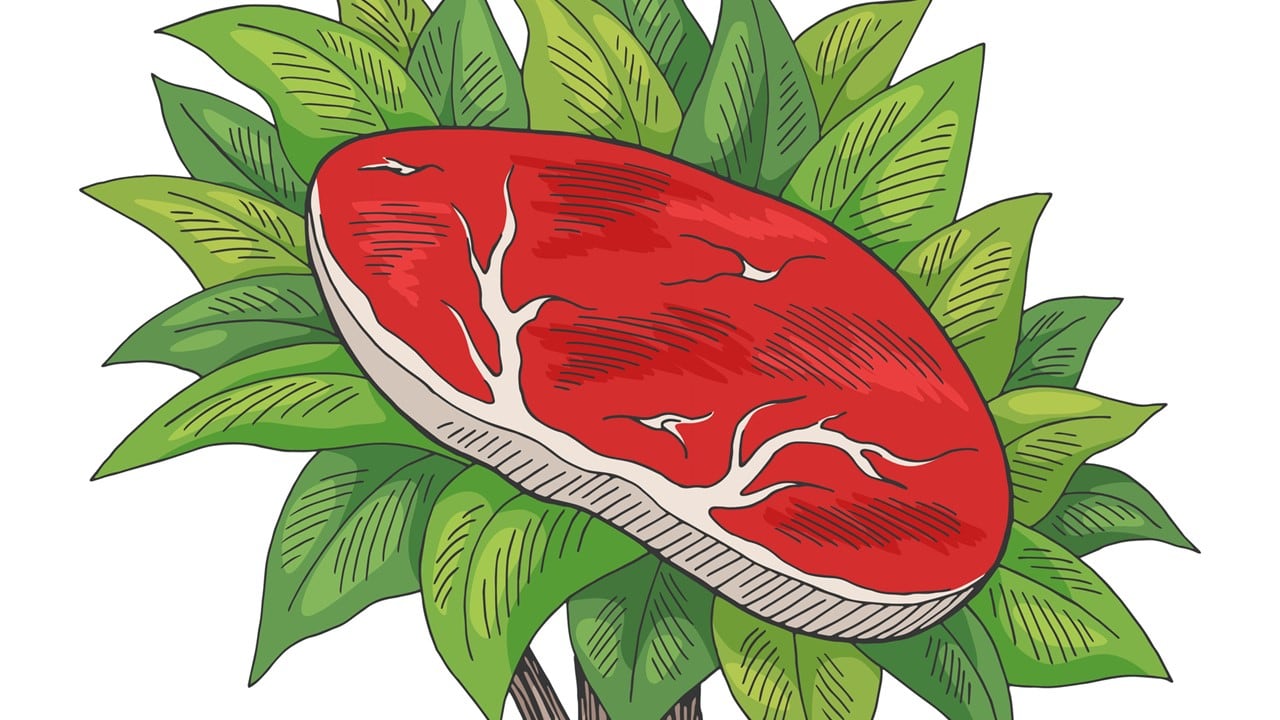Silk Greek Style Coconutmilk Yogurt Alternatives in lemon, strawberry, blueberry, and vanilla flavors are designed to meet the needs of shoppers that are open to plant-based options, but don’t feel like the current offerings hit the spot, said Lia Stierwalt, senior director of marketing at Silk, who noted that 70% of shoppers buying plant-based milk are not yet buying plant-based yogurt.
Made with a coconutmilk base, each 5.3oz cup of Silk Greek Style contains 10g protein from pea protein (a standout in the plant-based set), 10g saturated fat from coconut cream (fairly high for a yogurt), 9-12g sugar (medium to low), and 190-200 calories (above average).
As a point of comparison, Danone’s So Delicious coconutmilk yogurt (vanilla) has fewer calories (130), and far less sat fat (3.5g), but no protein and more sugar (15g); Chobani regular dairy Greek yogurt (vanilla) contains fewer calories (110), no fat, the same amount of sugar (12g) and more protein (12g).
‘We believe it will explode the plant-based yogurt segment, similar to what Greek did for dairy back in 2008…’
So what makes Stierwalt so confident that the product will add incremental growth to the plant-based yogurt category, which according to SPINS and IRI US retail sales data, was up 20% in 2020 to $343m in measured channels?
“We think this innovation is absolutely a game changer, we believe it will explode the plant-based yogurt segment, similar to what Greek did for dairy back in 2008, because it addresses the top barriers that we know consumers have with plant-based yogurt, primarily taste and texture," she claimed.
“This is the thickest, best-tasting plant-based yogurt on the market with double-digit protein, so the opportunity for disruption is huge. We know that 86% of current plant-based yogurt users want that added health benefit from their plant-based yogurt, like high protein.”
She added: “Traditional Greek yogurt accounts for about 44% of all yogurt sales, and really dominates the dairy category, but no brand to date has really nailed Greek in plant-based until now.
“We haven't seen anything that has delivered on Greek’s signature thickness and texture. Silk Greek is so thick, you can turn your spoon upside down, and it's not going to fall off.”
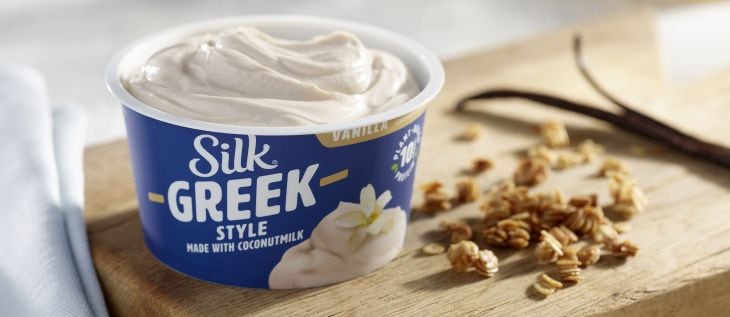
Ingredients (Silk Greek vanilla): Coconutmilk (filtered water, coconut cream), cane sugar, pea protein, water, pectin, natural flavor, calcium phosphate, citric acid, live and active cultures, vitamin D2.
Nutrition: Each 5.3oz cup contains 10g protein, 10g saturated fat, 200 calories, and 12g sugar.
‘We can draw on our [formulation] expertise as a company in dairy and plant-based’
While formulation experts note that getting a decent level of pea protein into a plant-based yogurt formulation can be notoriously challenging, while pea-protein-fueled brand Ripple Foods acknowledged that its first foray into the plant-based yogurt market was not ready for prime time, Danone “can draw on both our expertise as a company in dairy and plant based,” said Stierwalt.
“What brands have really struggled with in the past is pea protein off notes, but we were able to combat that and really get over the hump and create a great tasting product.”
‘We have the highest repeat rates, we have the highest velocities in the segment’
Danone already has a leading position in the plant-based yogurt market via its Silk and So Delicious brands, noted Stierwalt, although she acknowledged that the dairy-free yogurt market ($343m in 2020 in measured retail channels) is far smaller than the plant-based milk market ($2.5bn in 2020), in part because it presents greater technical/formulation challenges.
“We have the highest repeat rates, we have the highest velocities in the segment, and we believe this growth is only going to continue with the launch of silk Greek. Our two brands are the clear leaders, and we will accelerate our leadership in the coming months and years.”
However, not everything that Danone has tested in the plant-based space has been a hit: the Good Plants almondmilk yogurt line – launched in early 2019 - was withdrawn in the back half of 2020, while Oikos dairy-free yogurt alternatives also failed to take off.
According to Stierwalt, “It comes down to portfolio simplification, our decision to eliminate Good Plants was really focused on doubling down on our leadership brands Silk and So Delicious. And we want to scale these brands for growth as we think they have the most potential.”
Incremental growth opportunity?
So, how are retailers thinking about the plant-based yogurt category?
“Overall,” said Stierwalt, “We see a ton of excitement around Silk Greek so much so that we believe this product to be incremental to our portfolio. We’ve even gone so far as to command off cycle resets because the proposition is so interesting to our customers.”
When it comes to supporting the launch, she said: “In the back half of this year, we’re focused on getting the word out that Silk Greek is thick, because we know texture has been a huge barrier to plant based yogurt, so we'll go out pretty strong with, PR, robust shopper and trial programs, digital support, social support, and then expand to a full on national 360 blitz come January.”
She added: “We know that 25% of the entrants coming into plant based yogurt are coming in through other brands, and when they come in through other brands they don't stay, whereas if they come in through our brands, we have the highest repeat rate in the segment on Silk and So delicious.”
